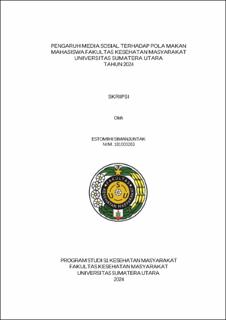| dc.description.abstract | Food is one of the basic needs for the growth and development of the body of
living things. If humans consume less food, both in quantity and quality, it will
cause disturbances in the body's metabolic processes so that it can lead to the risk
of disease. In addition, if humans consume excess food without being balanced
with sufficient physical activity, humans will be at risk of degenerative diseases.
The purpose of this study was to determine the effect of social media on the diet of
students of the Faculty of Public Health, University of North Sumatra in 2024.
The sample in this study were 80 students. Measurement of social media variables
is measured based on the intensity of social media use through the SONTUS
(Social Networking Time Use Scale) measurement instrument which has been
modified by researchers with a Likert scale. Diet is measured using a
questionnaire containing questions. Data analysis in this study used the chisquare test. The results of this study indicate that the influence of social media on
FKM USU students is dominated by the low category, namely 48 respondents
(60%). Furthermore, most FKM USU students have a eating pattern, namely 46
respondents (57.5%). There is no relationship between individual characteristics
and the eating pattern of students of the Faculty of Public Health, University of
North Sumatra, the p value per each category of student characteristics of the
Faculty of Public Health, University of North Sumatra, namely, p value = 0.350 >
α = 0.05 in the gender category, p value = 0.910 > α = 0.05 in the age category
and p value = 0.242 > α = 0.05 in the study program category. There is a
relationship between the influence of social media and the diet of students of the
Faculty of Public Health, University of North Sumatra in 2024 with a p value =
0.002 < α = 0.05. It is expected that FKM USU students can increase knowledge
and awareness about the adverse effects of excessive social media use and its
relation to dietary problems.
Keywords : Social media, eating pat | en_US |


